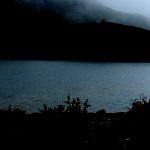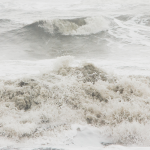They came from the village right before dawn, covered in thick wool clothes that left just enough space for the arms to move. I could only see their eyes through the gap between the berets and the scarves. They entered the house, an empty skeleton by now, all its contents safe. If anything, I had to appreciate that, at least. Many of these people had not been as lucky, the waters had come first.
In line, following Byrne’s lead, they removed one glove to shake my hand, and pat my back. The small procession reminded me of when my grandfather died, and then my father after him. Always in this house by the cliff.
They crammed the chairless, sofaless sitting room and helped themselves to thermoses of coffee standing on the barren floor. Byrne muttered that there was no time, but the others nodded, wrapped their fingers around the hot drink. Coffee made the conversation bubble more than alcohol did with that lot. I found myself smiling.
Byrne looked outside. He said the storm was coming, and this would be the one.
I watched everyone leave, the same procession, in reverse. By now the winter sun had appeared. I walked around the house one last time, stopping at each window. I saw the white fields from the sitting room. The wind was building up, scooping the snow from last night. I watched the forest from my bedroom, upstairs, and the little bay. The views my family had enjoyed for decades. A house is not just what is inside its walls, it’s all that surrounds it: it’s the way the sunlight floods a room in the morning, it’s the song of the birds nesting each year in the same hedge, it’s the scent of the elderberry flowers late in spring.
I went into the kitchen, and gazed at the sea. Low rays of sun cut through the clouds growing on the horizon. The wind made the windows screech. Byrne was right: the clouds were coming in our direction. Fast.
I joined the others outside. Round poles had been lined up, the first right next to the northern end of my house. The ropes were all secured, a gigantic lazzo around the building, fastened in due time, before the sea and the wind had eaten all the coast beneath the southern side, carving the cliff like a sculpture, making the coast below beautiful, if not for the fact my house was right there, right on the edge. Any time soon, the kitchen would fall. And then my bedroom. And everything else.
I had seen other houses like that. We all had: from the boats at sea, they looked like doll houses, sometimes with a coat still hanging in the hall, or a lamp on the bedside table. Until that too plunged into the water.
They were all in line now, already holding the ropes. Byrne was going up and down. He would be directing the operation, telling how to pull, and which way to go. Which was ironic given that Byrne had a lazy eye. But he saw things we couldn’t see, that’s what the people in the village said. And he had been the one to discover this way to save our houses, secure a future, if not the past, while the waters rose.
‘You’d better go there to watch, it will be safer,’ he said pointing at a hill where a small crowd had already gathered, shielding their eyes from the snowy wind. Mostly old people and children, for the women too were called to help.
‘I want to do my part,’ I said.
‘You can’t. It’s a fine balance, you’ll be too emotional.’
I looked at the others, already in position, eager to begin.
‘You’ll help them when it’s their turn,’ he said.
This did the trick, and I joined the crowd on top of the hill.
I saw Byrne checking the poles once more, and then moving the last people around, changing the position of a couple of men. Then he ran to the end of the ropes, and turned to look at me. I nodded.
A gust of wind brought his order:
‘Pull.’
…
Biography
Slawka G. Scarso has published several books on wine in Italy and works as a copywriter and translator. Her short fiction has appeared in Ellipsis Zine, Mslexia, Bending Genres and Spelk, among others. She lives between Rome and Geneva with her husband and her dog, Tessa. @nanopausa | www.nanopausa.com.
Image: unsplash.com





